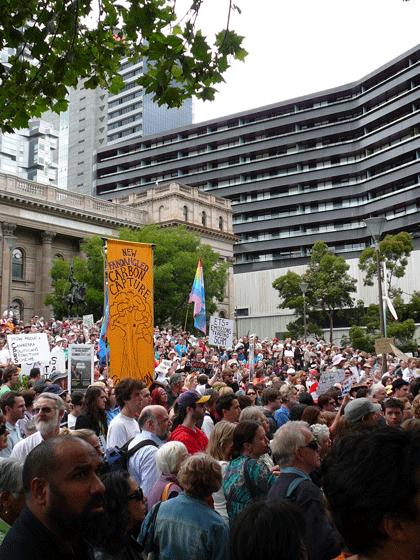Published: 4 May 2011
Towards baseload solar thermal power
James Porteous
Spain’s latest large-scale commercial concentrating solar thermal plants have advanced the generation of solar energy around the clock by using thermal storage. Meanwhile, research continues on the role that concentrating solar thermal plants can play as baseload power support technology under different scenarios.
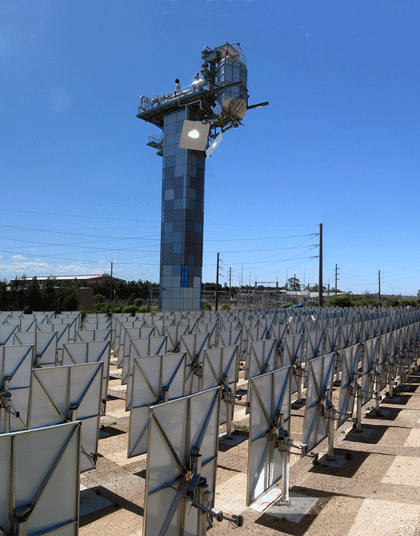
|
|
The new solar tower at CSIRO’s National Solar Energy Centre, Newcastle. Credit: CSIRO
|
Traditionally, solar energy generation has only occurred when the sun shines, so it is often said that solar plants can’t ‘do baseload’ – that is, they can’t reliably produce 24-h electricity required to power society. But there is growing global interest and investment in new concentrating solar thermal (known as CST but sometimes called CSP for Concentrating Solar Power) power plants that can store energy and generate mains power, even when the sun is not shining.
CST technology
Broadly speaking, the various industrial CST energy generators in operation are made up of different arrangements of mirrors and heat ‘receivers’: troughs, power towers, linear Fresnel and dishes (the different designs are described below). All commercial large-scale solar thermal plants currently heat oil, molten salt or water to generate steam. The steam powers a turbine, which in turn spins an electric generator to create AC (alternative current) power. From the point at which the steam is generated, a CST plant is identical to a coal, gas or nuclear plant in its operating principal. CST solar plants are distinguished by how that steam is generated in the first place.
The latest generation CST plants use molten salt energy storage and can maintain full turbine output for between 7.5 and 15 h straight, without any sunlight at all. While the use of molten salt storage as a ‘battery’ is not an entirely new concept, it is the demonstration at scale that is of interest. It overcomes variable electricity supply, a key barrier facing other renewable energy technologies.
The big advance with heat storage
In November 2008 Spain’s 50 megawatt (MW) Andasol 1 CST plant started feeding power to the grid near Granada in the country’s south, supplying power around the clock using an advanced system of heat storage in tanks of molten salt. Andasol is a trough plant; when its mirrors are collecting sunlight, it heats a synthetic oil that is passed through a heat exchanger to re-heat the ‘cold’ salt before being pumped back into the hot tank. When electrical generation is required, the liquid salt is pumped through a heat exchanger: the heat is transferred to water, which becomes steam that drives a conventional rankine-cycle steam turbine (Siemens SST-700 turbines), and then returned to the ‘cold’ tank.
The adjacent Andasol 2 plant was completed soon after, and as of March 2011 Spain had 11 CST plants, for a total of 765 Mwe of solar thermal in operation, more than half of which has molten salt storage. Planned solar thermal capacity is expected to push the total to 2500 MW by 2013, with the Spanish sector standing to exceed 10 000 MW by 2020.1 These CST plants are rated with 7.5 h of thermal storage each, however, operators can produce electricity over longer periods by running at lower output, giving the plant round-the-clock generating potential.

|
|
The completed Gemasolar Solar Tres plant with adjoining salt storage tanks in situ beside the tower. Credit: Torresol Energy
|
‘Power towers’ and storage
Attention is now focused on the recently completed Gemasolar (pronounced ‘hemasolar’) Solar Tres project near Seville, also in the south. Solar Tres is the first commercial CST plant of ‘power tower’ design to have salt storage – some 15 h worth. The tower configuration allows the plant to achieve higher operating heat and efficiencies. The salt will be heated to ~565°C, meaning greater energy storage and greater thermal efficiency than for a trough plant. At these temperatures, each megawatt hour (MWh) of energy generated requires ~25 tonnes of salt. Plants operating at lower temperatures require proportionally more salt per unit of energy stored. Trough plants have an upper temperature of 400°C and store energy at the ratio of 1 MWh per 75 tonnes of salt.
Changing the relative sizing of the mirrors, storage and turbine in plants allows for a different balance between maximum power and energy storage. In the case of Solar Tres, the sizing choices mean 15 h of storage at full power, giving true baseload capacity. These levels of average utilisation (~75 per cent) compare favourably with Australian base-load coal-fired power plants (on average NSW coal plants operate at an average 63 per cent of rated capacity).
Solar thermal in the US
While Spain leads with the first commercial CST-towers-with-storage plants, the US Bureau of Land Management (BLM) has received 148 applications for solar developments (97 000 MW potential) on public land. Many of these applications are for superior tower-type systems using molten salt for 24-h supply. Fred Morse, head of the Solar Energy Industries Association, and Thomas Mancini, head of Sandia National Laboratories, expect up to a dozen large-scale commercial solar thermal plants to break ground this year.
Costs of the technology
The US, first-of-kind medium-scale (75–150 MW) solar plants with thermal storage can generate power at about AU$0.25/kWh. New technologies always follow a cost reduction curve once they mature and economies of scale are realised. Research by Melbourne’s Energy Research Institute2 suggests that CST could hit parity with new coal and gas plants once global installations are in the order of 10 000 MW, which even under business-as-usual growth could occur by 2020 or earlier with the combined growth in existing markets of southern Europe, North Africa and the United States. Companies Torresol Energy from Spain, and Solar Reserve from the USA, now provide commercially available solar power systems (with storage) with operating characteristics comparable to a conventional coal, nuclear or gas combined cycle plant.
In its recent report ‘Zero Carbon Australia – Stationary Energy Plan’3, Beyond Zero Emissions (BZE) posits that Australia’s entire energy needs could be met with a 60:40 mix of Spanish-style solar thermal, and wind. Technologies like geothermal and wave power show promise, but solar thermal and wind can be deployed at scale today and are sufficient to entirely power the country. But, while BZE support the potential of CST with thermal storage to contribute to energy supply in Australia, they believe that policy and financial frameworks are required for commercial maturity and wider application.
Australia and CST
Australia’s interest in the potential of CST has been led by CSIRO for more than a decade. Research is focused on finding pathways to least-cost but highest thermal-efficiency solar collectors and ‘receivers.’ There is now also concerted exploration underway into next-generation high temperature thermal and battery storage, which at 1400°C could achieve 50 per cent more electricity from the same collection area.
Dr Jim Smitham, Deputy Chief at CSIRO’s Energy Technology Centre in Newcastle, says while the Spanish and US CST thermal storage plants are important demonstrations of the technology’s potential, large-scale, in Australia, CST hasn’t proven itself enough commercially as standalone technology – compared to, say, wind power. It still needs to secure financiers’ confidence that here it can be a profitable, responsive supply to meet the fluctuating daily demand pricing (serving shoulder price and peak price periods is particularly important). ‘That’s why CSIRO is looking at a transition pathways role for CST technology that assists already commercially endorsed fossil fuel generation to shift to lower carbon operation.
‘As well as investigating stand-alone CST, we are investigating hybrid solar/fossil fuel and solar/geothermal plant combinations, including solar-assisted gas turbine or high-temperature steam support for fossil fuel power stations to achieve greater thermal efficiency at lower cost.
Dr Smitham also says ‘Molten salt is not the last word in CST power storage. We still need very high temperature, low-cost storage to be available at different scales. Over the last 18 months, CSIRO has started looking at the leading edge in least-cost, higher temperature storage beyond molten salt.’
More information
More on the different CST technologies
Trough plants
Trough technology is the most proven CST design. The largest solar generation facility in the world, called Solar Energy Generating Systems (SEGS) in California, uses troughs. SEGS is a set of nine plants near Kramer Junction in the Mojave Desert. Jointly they have a capacity of 354MW.
In a trough configuration, long lines of horizontal, parabolic mirrors focus solar radiation on a pipe through which a fluid is pumped and heated to a maximum of around 400°C. The fluid is usually a high-grade synthetic oil which does not boil or degrade at high temperatures.
In a trough plant, the mirrors rotate around their long (North–south) axis to follow the Sun during the day. Because they remain horizontal, and so don't track the Sun's elevation, trough mirrors are most effective close to the Equator where they don’t suffer reduced solar efficiency – called the projection effect’ – from this inability to follow the sun’s elevation. At the latitudes of southern Australia, trough mirrors are only about half as effective as a mirror that can more closely track the sun.

|
|
Trough mirrors from a Spanish solar power plant. Credit: BZE
|
Linear Fresnel plants
The curved mirror structures of a trough plant are very expensive. A less-expensive variant on the trough mirror configuration is a Linear Fresnel (pronounced 'frenell'). which uses long, near-flat mirrors close to the ground to make an optical approximation of a parabolic trough, without the structural complexity.
These systems, such as those from Biotec Novasol (owned by Australian company Transfield) and Areva Solar (formerly Australian company Ausra), have relatively low operating temperatures of around 290°C. Therefore, no commercially viable energy storage is available because not enough heat is generated to liquify storage salt. However, Linear Fresnel companies are moving to higher temperatures and pressures, such as Mann Ferrestel / Solar Power Group who are offering a 450°C operating temperature, meaning more viable efficiency for thermal storage.
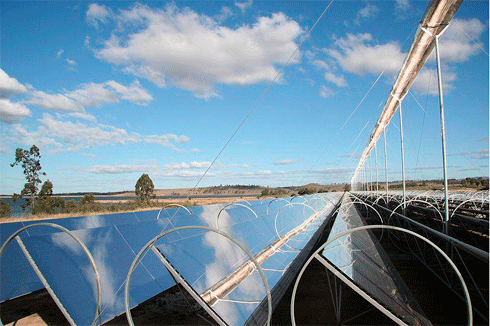
|
|
A Linear Fresnel assembly. Credit: Areva Solar
|
Dish plants
Mirrors in a dish configuration are effective at concentrating the solar rays and track the sun in two axes. They can achieve temperatures as high as 2000°C (but are typically run at between 500°C and 650°C for electricity generation). Historically they've been expensive and not often used in solar energy plants. Australia's first solar thermal power plant was a 25kW dish-based facility developed by The ANU at White Cliffs in NSW which operated from 1981 to 1996 for an off-grid community.
The ANU has since developed the world's biggest mass production solar dish system - the ANU SG4, fourth-generation dish - which is now ready for mass production. To save costs, it is built in the field on a very accurate jig, instead of adjusting the dish after it has been manufactured.
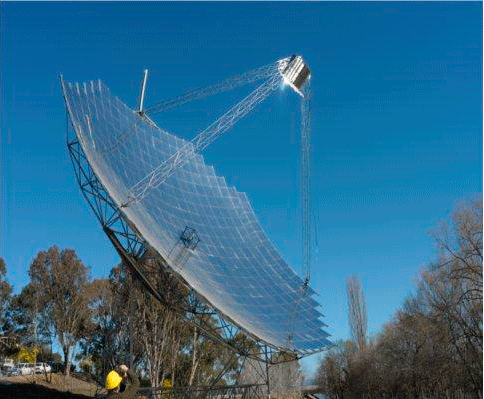
|
|
An SG4 dish mirror from ANU in Canberra. Credit: BZE
|
Tower plants
Tower-based systems use a large field of near-flat, independently controlled mirrors called heliostats to focus light on a central receiver at the top of a tower. Heliostats are spaced to ensure they don't overshadow each other. Tower configurations can scale up to involve many hundreds, or thousands, of mirrors. This gives towers the greatest capacity to concentrate the sun's rays, leading to higher operating temperatures.
A modern tower-based solar plant would typically pass a fluid through the ‘receiver’ to be heated up to ~570°C (and in future up to ~650°C). At this temperature, electrical generation can be more efficient and cheaper than that from a trough configuration which heats to ~400°C.
The turbines required in conjunction with a tower are the same as those used in coal-fired plants, whereas the turbine technology required for lower-temperature operation is considerably more expensive because of the much lower economies of scale.
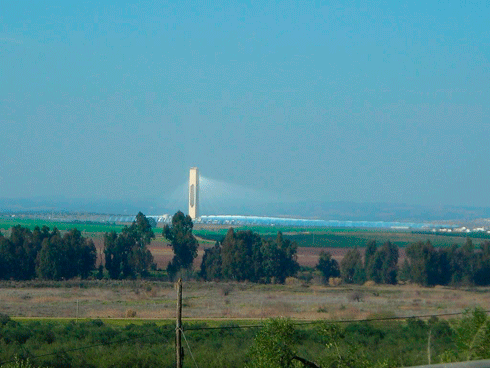
|
|
Spain’s PS10 power tower near Seville. Credit: BZE
|
Capturing the sun efficiently – the projection effect
|
|
Heliostat mirrors track the sun in two axes which makes them more efficient than horizontal trough mirrors, especially in winter and when sited further from the Equator. Compared with a dish, which gives the best sun tracking, a trough mirror captures ~75 per cent less energy in winter at temperate latitudes because of the low angle of the Sun. This reduction of collection capacity is called the projection effect. |
Solar engineers use the term insolation to describe the measurement of received solar energy, and Direct Normal Incidence (DNI) to describe the solar energy available to collectors which track the sun, i.e. no projection effect. For horizontally configured mirrors, the insolation is less (due to the projection effect) and measured as Global Horizontal Irradiance (GHI). |
 The projection effect comparing vertical sun's rays with rays at 30 degrees.
The projection effect comparing vertical sun's rays with rays at 30 degrees.Credit: BZE
|
|
The solar resource
It is often highlighted that Australia’s solar resource greatly exceeds our energy needs. At ground level, the power of the Sun on a one meter square surface, at right angles to the Sun's rays, is ~1 kW (kW).
Excluding cloud effects, this gives an average of ~6 kW-hours (kWh) per day for every square meter collecting sunlight. Across a sunny country as large as Australia, this represents a phenomenally large resource.
Solar energy equivalent to Australia's total current electrical peak generation capacity (~49GW4) falls as sunlight on a square area ~8km by 8km (at noon at southern Australian latitudes), or ~0.001 per cent of Australia’s landmass.
When you take into account typical sunlight patterns, and typical plant efficiency and layout, you still need less than 0.05 per cent of Australia's area to generate equivalent power. To put the required land area in perspective, it would fit six times in Anna Creek, Australia's largest cattle station.
Text explaining the different CST technologies provided by Beyond Zero Emissions (BZE).
1 www.protermosolar.com/prensa/2010_07_12/comunicado_12_07_2010.doc
2 Hearps, P and McConnell, D (2011), Renewable Energy Technology Cost Review, University of Melbourne Energy Research Institute, Melbourne, http://tinyurl.com/3eeczvm
3 Full report: http://tinyurl.com/262jzj2
4 According to ABARE 2010 http://www.abare.gov.au/publications_html/energy/energy_10/energyAUS2010.pdf


